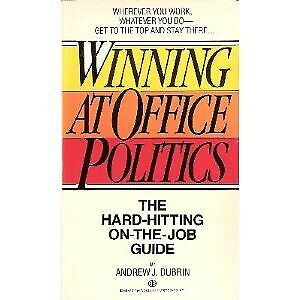 Office politics is important to study because one must understand it in order to effectively handle the political games and power struggles that can interfere with employee careers and productivity. In the July 10, 1984, Washington Post “Federal Diary,” Mike Causey reported that of 800 senior federal personnel officers responding to a Merit Systems Protection Board survey, almost one in every five said that they had been improperly pressured by managers to save or fire employees during the 1981 reduction-in-force.
Office politics is important to study because one must understand it in order to effectively handle the political games and power struggles that can interfere with employee careers and productivity. In the July 10, 1984, Washington Post “Federal Diary,” Mike Causey reported that of 800 senior federal personnel officers responding to a Merit Systems Protection Board survey, almost one in every five said that they had been improperly pressured by managers to save or fire employees during the 1981 reduction-in-force.
Good management and supervision includes an understanding of office politics and power. Because the phrase “office politics” has a bad reputation, even its beneficial and ethical aspects are not usually the subject of serious attention. Managers, supervisors and employees may not advance in their careers sufficiently because of their disdain for office politics and its prudent use. If a manager is unaware of and not in control of the politics in his/her office, s/he will not be able to manage his/her employees and programs as well. On the other hand, excessive involvement in office politics can drain the energy, time, motivation and productivity that should otherwise go into the job. Dr. Andrew Dubrin, in his 1990 book, Winning at Office Politics, cites five levels of involvement in office politics, from the most political to the most naive. They are: Machiavellian, Office Politician, Survivalist, Straight Arrow and Innocent Lamb. For those who are interested, Dr. Dubrin’s book contains a 100-question test which will show how political you are.
The Types of Office Politics
I classify office politics into three categories: clean, dirty and situational. “Clean” (ethical) office politics comprises those things one can do to advance his or her career and get the job done at no one’s expense and without being unethical or immoral. Examples of clean office politics include loyalty to one’s supervisor and working in one’s own interest. “Dirty” office politics is immoral and/or unethical and is something which is done to the detriment of others. Examples of dirty office politics include backstabbing and stealing credit for another’s work. “Situational” office politics, as its name implies, is ethical or not depending upon the situation in which it is used. A good example of situational ethical office politics is the “fait accompli” (accomplished fact). This tactic simply involves taking an action even though it will not be welcomed by the boss. Later, after reaping the benefits of the action, the employee pleads innocence if the boss questions him/her on it. The employee tells the boss that s/he didn’t now that it would meet with disapproval. With some supervisors this tactic is sometimes necessary though not without risk. Another tactic is “going over the supervisor’s head.” If the tactic is used on a straightforward democratic supervisor, it is usually unethical; therefore it is considered situational office politics. Another situational ethical tactic is “withholding information.” White collar workers are knowledge workers and information is their stock-in-trade. There are times, however, when it is ethical to withhold information, such as when a supervisor will take all of the credit for the information supplied and not give the employee proper credit.
CLEAN OFFICE POLITICS
How to Treat Supervisors
No matter how high a level employee you are, there is always someone you must answer to. Therefore, in your role as a subordinate, the keystone of office politics is your relationship with your boss. If you keep your relationship sincere and unmanipulative, you are using clean office politics. Your aim is to help make your boss look good. There are many clean tactics which you can use to improve your relations with your boss. The simplest is showing your boss loyalty. Loyalty is reporting only to the boss and not going behind his/her back to others; following and respecting the boss’ direction without grumbling or second guessing; disagreeing with the boss only in private; making efforts to instill the boss’ ideas, plans and actions in other employees; not disclosing secrets about the boss; and standing up for the boss when s/he is the subject of criticism.
While teaching an adult education course in “clean” office politics and power in Washington, DC, I found that loyalty to the supervisor is the most difficult for people to understand, let alone accept and use. Students frequently volunteered opinions, such as “my boss is a fool, I know much more than s/he,” and “I don’t know how that idiot ever got his or her job.” Perhaps much of what I hear about supervisors and managers is true; maybe many of them are incompetent in managing work and people. Whether it is true or not is irrelevant here. The boss has legitimate power; s/he writes your performance appraisals, has the responsibility for your work, and can either praise or discredit you to his or her superiors. If you and your boss don’t like, or at least respect each other, and there’s nothing on the horizon which may change the situation, you should consider changing jobs. Incidentally, showing loyalty to the organization you work for also makes good political sense, although personal and organizational loyalty may not be compatible at times.
How to Treat Peers
The respect and cooperation of your peers is another essential component of clean office politics and obtaining power ethically. A few tactics should help you achieve this sometimes very elusive goal: help peers when they need it; be trustworthy and friendly; back them up; don’t complain about all the work you have to do; and avoid pretentions. Incidentally, most dirty office politics occurs among peers, so the above is especially important if you want to minimize the risk of fostering their envy, and the malice, slander and sabotage that it can foster. Envious people try to downgrade the person and/or the person’s accomplishments of which they are jealous.
How to Treat Subordinates
Finally, relations with subordinates have a role in office politics. Giving recognition for the good work of a subordinate is an outlet for genuine appreciation. Treating subordinates with respect because they are people first and employees second is both humanistic and, coincidentally, part of being a good manager. Finally, a supervisor should not take advantage of subordinates with his/her power.
The aforementioned clean tactics are referred to as political or interactional skills and are most important in judiciously using office politics and power ethically. Other clean tactics fall under the aegis of “visi-posure.” This is a combination of visibility (seeing those above you) and exposure (being seen by those above you). The following are some examples of ethical tactics you and/or your staff could engage in:
- Staff promoting themselves by talking with you about their progress and keeping you informed of what they’re doing.
- Staff originating and initiating new ideas, putting them in writing and giving them to you.
- Staff getting to know the people in the organization by attending office parties, using the cafeteria at work and remembering names.
- Staff developing a professional attitude by avoiding excessive emotionalism, dressing for success, not engaging in negative gossip about people and not being a clock watcher.
- Staff speaking up at meetings because that is where they are sometimes seen by people who do not usually see them.
- Staff asking questions because this is necessary to obtain the information they need to continually improve their job performance, as well as showing their concern for the job.
- Staff doing things outside the confines of the job. This allows them to meet people throughout the organization.
- Staff talking about their progress so you know that they have definite goals and want to get ahead.
- Staff developing a support system through involvement in professional organizations. This provides them with a support system separate from the job and can be important if they run into serious political difficulty on the job.
- Staff developing a specialty so they can stand out from the crowd and get the recognition they need to advance their careers.
DIRTY OFFICE POLITICS
Up to this point we have dealt only with clean office politics. Let’s look at the dirty side so that you can more effectively protect yourself and your staff from it.
Paranoia vs. Naivete
To consider dirty office politics rationally, one must endeavor to be completely objective about oneself. Some people are absolutely convinced that someone is out to get them. Because people, on occasion, are really out to discredit someone else for various reasons, one needs to make a clear distinction between objective reality and paranoid thinking. Paranoid thinking exists when the amount of fear, anxiety and concern is not justified by real danger. To illustrate, it might be considered paranoid to be excessively fearful of crime in a predominantly crime-free community, whereas, to be concerned about being mugged while walking along some sections of the formerly infamous Fourteenth Street corridor in Washington, D.C., at one o’clock in the morning is prudent, not paranoid, and should result in appropriate action (like quickly leaving the area). To combat paranoid thinking, if you believe someone is out to get you, ask yourself “how do I know this to be true-;” “what am I observing that leads me to that opinion;” and “is this sufficient to warrant my belief that someone is out to get me?” It often takes considerable thought to sort out all the relevant information and form a rational opinion as to whether or not you’re someone’s target.
On the other hand, though not bad in terms of mental health, naivete in office politics can be hazardous to your career. If you think that everyone’s out to help you, give yourself a naive-zero on the accuracy of perceptions scale below. Likewise, if you see a coworker’s power and influence rising as yours is descending and you do not get at least a little suspicious, score yourself once again near the naive-zero on the scale. Another indicator that you may be an actual or potential victim of dirty office politics is when former enemies in the office suddenly become friends; they may have found a common enemy — you. The graph below illustrates the distinction between being paranoid and being naive. It is intentionally simplistic to illustrate the point.
Accuracy of Perceptions Scale
0______________100_____________0
N R P
A E A
I A R
V L A
E I N
T T O
E Y I
Slander
Slander differs from gossip in that gossip is not as malicious, persistent and purposeful as is slander. One defense against slander and backstabbing is not to allow the slander to damage your self-image. Another defense is to launch a small counterattack. by innocently asking associates on occasion why the slanderer is so unhappy. By knowing that someone is slandering you, you can more effectively combat it. The following are options you have to-combat slander: 1)confrontation; 2)exposure; 3)retaliation; 4)rewarding the guilty party to make him or her feel guilty, suspicious or confused; and 5)eliminating the cause. Often people readily accept stories on the grapevine without verification. Most of the time these stories contain partial truths, misunderstandings, distortions or outright misstatement of fact. Clever slanderers, however, base their dirty work on real incidents; they simply define or explain the incidents in an intentionally-distorted manner so as to make someone look stupid or incompetent. They also get to the manager first with their distorted version of an incident so as to “poison the wells” for any other versions that may follow. Since supervisors and managers must rely, in large part, on information from subordinates, they therefore have to be especially wary of the derogatory comments they hear about employees. Since the “reputation” method is commonly used by managers to informally assess staff, even if a diligent manager follows up on rumors and makes first-hand observations of an employee, selective perception may bias the observation, since s/he is starting out with preconceived ideas that were furnished when one subordinate gave the “lowdown” on another. To counter the tendency towards selective perception, a manager must suspend judgement until s/he has sufficient data to form a defensible opinion. Personally, I prefer confrontation and asking an employee and thereby allowing him or her opportunity to explain.
A devious tactic, less onerous than backstabbing and stealing credit, is using flattery (not genuine praise) to manipulate people into doing what you want them to do. Constantly raising questions concerning a peer’s judgement and providing misinformation (with some truth thrown in for plausibility) is another tactic practiced by clever unethical office politicians.
SITUATIONAL OFFICE POLITICS
Of the three types of office politics, “situational” is the most difficult to use wisely. This is because most people have an image of themselves as being good, honest, righteous, ad infinitum, and they therefore rationalize many of their actions as being warranted by the situation or someone else’s actions. Many atrocities have been explained and “justified” by situations. The most recent examples are acts of terrorisrn which killed or injured innocent people.
In addition to the fait accompli mentioned earlier in this article, “avoiding losers” is a situational tactic. If you lunch and socialize with other managers, supervisors or staff with bad reputations, it is likely that your reputation may be tarnished. If the person with a bad reputation is a friend, avoiding that individual solely because of his or her reputation is a situational tactic that only you can judge as ethical or not. Another situational tactic is the “red herring” which is useful for managers because of the desirability of handling tricky personnel problems without needlessly humiliating people. For example, a manager may not want to tell, for some legitimate reason, an employee the full story of why s/he is -being fired, but use a “red herring,” or explanation that diverts attention from the blunt truth.
Discouraging Unethical Office Politics
At this point you may asking yourself if there’s anything that can be done to dissuade employees from engaging in dirty office politics. It should be clear to managers that staff are going to get involved to some extent in office politics and will not make the ethical distinctions enumerated here. There are, however, a few tactics that managers can use to improve the chances for ethical behavior and a more decent office environment to thrive:
- Keep your staff busy. Employees engaged in meaningful work and achieving worthwhile goals don’t have as much time and energy for office politics, clean or dirty.
- Keep your staff well informed. Communication is an important part of the manager’s job and lack of it will foster conjecture, which is usually much worse than reality.
- Give your employees, to the extent practicable, separate responsibilities, to minimize jealousy and cut-throat competition. Sometimes overlapping responsibilities are necessary, and even desirable, but if an organization can be structured without it, there will be more peace and harmony.
- Be non-judgemental in dealing with your staff. If you want them to listen to you, and take your advice when you really need them to, they must trust you. That means not only respecting their confidences, but also empathetically listening to their complaints and problems.
- Trust your staff. Expect them to do the right thing and help them to do it. This should help curtail devious behavior. The German philosopher Goethe said “Treat people as if they are what they ought to be, and you will help them to become what they are capable of being.”
- When interviewing job applicants for a vacancy in your office, look for compatibility with your other staff. An applicant’s resume should tell you most of what you need to know about his or her knowledges, skills and abilities to do the job. The interview should help you tell how friendly, cooperative, and loyal the applicant is.
- Build team spirit to encourage mutual support and understanding. Meetings can be a useful tool in accomplishing this, but the attitude of the manager is essential.
- Give your employees an opportunity to read about office politics. Often, people engage in unethical behavior because they cannot distinguish between what’s ethical and what’s not. This article has been written to remove that ambiguity.
POWER
Power and office politics go hand-in-hand. The more power one has, the more effective his or her office politics can be. Power is defined here as the ability to marshal the resources to get the job done. There are basically six sources of power: 1)legitimate, 2)reward, 3)coercive, 4)referent, 5)expertise and 6)charismatic. Legitimate power is the official power you have as a manager in an organization; you have reward power if you can promote; you have coercive power if you can fire. Associate with or have a good rapport with one or more of the leaders with power in your organization and you have referent power. If you’re an expert at your job, you have expertise power. President Kennedy and Dr. Martin Luther King are good examples of people who had charismatic power.
A manager automatically has legitimate, reward and coercive power. If you’re a good manager, you probably have some charismatic power. How does one obtain more power? You can develop referent power by becoming friendly with other managers. Many people who have very little legitimate power have enormous referent power. Secretaries are good examples of this phenomenon. Become excellent at your job and you’ll gain expertise power. Develop your verbal and non-verbal skills, dress for success, and develop desirable leadership skills through education, training, reading and experience, and you’ll be on your way to developing charismatic power.
CONCLUSION
Office politics is a fact of organizational life. This article has discussed clean, dirty and situationally-ethical forms of it. The most useful political tactic, however, is one called “honest and straightforward.” It is not only the easiest to use, it does not cause ‘the anxiety that many of the other tactics do. Work would be far more pleasant if all interactions were of this type, however an awareness of the other types is essential.
If you are like most employees, you not only deplore office politics, you are absolutely convinced that you do not engage in any form of it, be it conscious, unconscious, clean, dirty or situationally-ethical. I hope that this article has accomplished three objectives: 1)made you more aware of office politics and therefore better able to handle it; 2)demonstrated that some forms of office politics can be ethical; and 3)adequately described dirty office politics so that there is more certainty as to what is ethical and what is not. An awareness of all types of office politics can be useful to you in succeeding in an ever-more competitive world.









